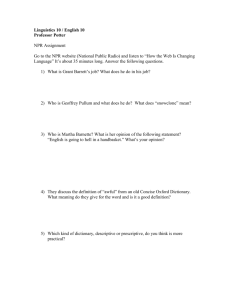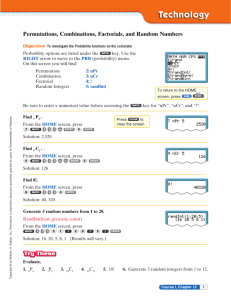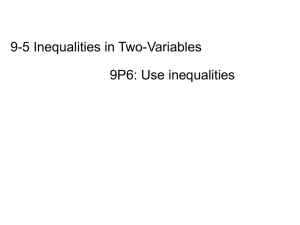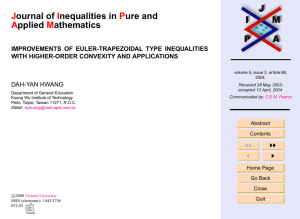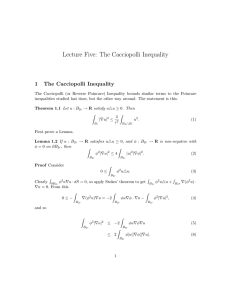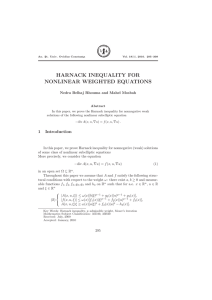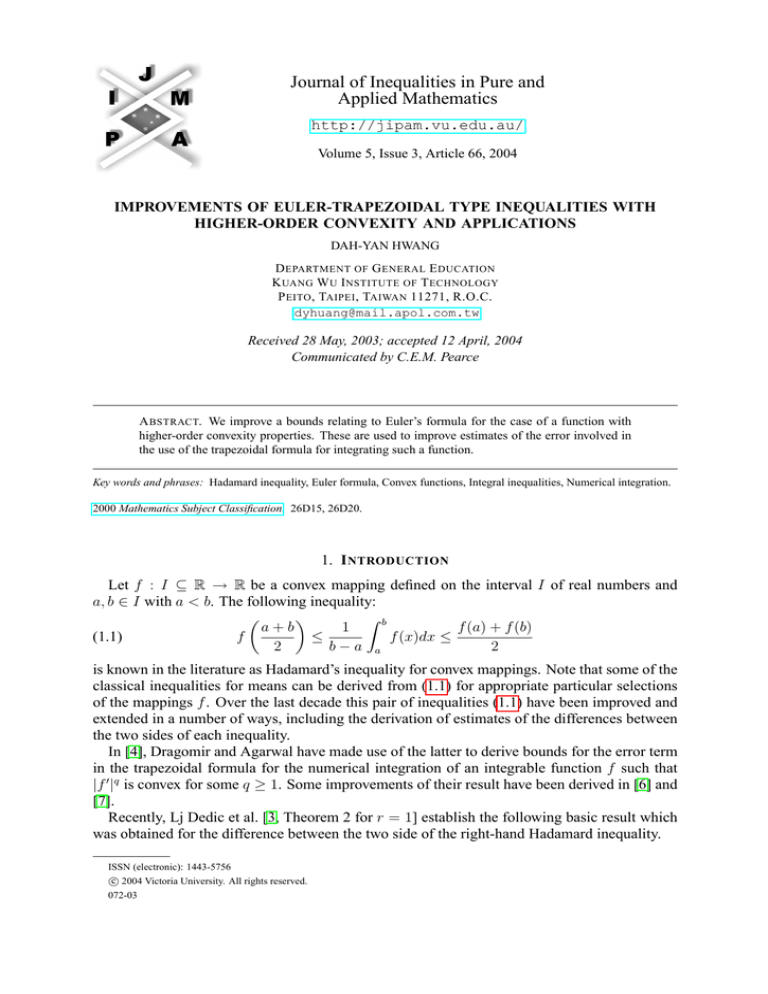
Journal of Inequalities in Pure and
Applied Mathematics
http://jipam.vu.edu.au/
Volume 5, Issue 3, Article 66, 2004
IMPROVEMENTS OF EULER-TRAPEZOIDAL TYPE INEQUALITIES WITH
HIGHER-ORDER CONVEXITY AND APPLICATIONS
DAH-YAN HWANG
D EPARTMENT OF G ENERAL E DUCATION
K UANG W U I NSTITUTE OF T ECHNOLOGY
P EITO , TAIPEI , TAIWAN 11271, R.O.C.
dyhuang@mail.apol.com.tw
Received 28 May, 2003; accepted 12 April, 2004
Communicated by C.E.M. Pearce
A BSTRACT. We improve a bounds relating to Euler’s formula for the case of a function with
higher-order convexity properties. These are used to improve estimates of the error involved in
the use of the trapezoidal formula for integrating such a function.
Key words and phrases: Hadamard inequality, Euler formula, Convex functions, Integral inequalities, Numerical integration.
2000 Mathematics Subject Classification. 26D15, 26D20.
1. I NTRODUCTION
Let f : I ⊆ R → R be a convex mapping defined on the interval I of real numbers and
a, b ∈ I with a < b. The following inequality:
Z b
a+b
1
f (a) + f (b)
(1.1)
f
≤
f (x)dx ≤
2
b−a a
2
is known in the literature as Hadamard’s inequality for convex mappings. Note that some of the
classical inequalities for means can be derived from (1.1) for appropriate particular selections
of the mappings f . Over the last decade this pair of inequalities (1.1) have been improved and
extended in a number of ways, including the derivation of estimates of the differences between
the two sides of each inequality.
In [4], Dragomir and Agarwal have made use of the latter to derive bounds for the error term
in the trapezoidal formula for the numerical integration of an integrable function f such that
|f 0 |q is convex for some q ≥ 1. Some improvements of their result have been derived in [6] and
[7].
Recently, Lj Dedic et al. [3, Theorem 2 for r = 1] establish the following basic result which
was obtained for the difference between the two side of the right-hand Hadamard inequality.
ISSN (electronic): 1443-5756
c 2004 Victoria University. All rights reserved.
072-03
2
DAH -YAN H WANG
Suppose f : [a, b] → R is a real-valued twice differentiable function. If |f 00 |q is convex for
some q ≥ 1, then
Z b
1
(b − a)3 |f 00 (a)|q + |f 00 (b)|q q
b
−
a
(1.2)
f (t)dt −
[f (a) + f (b)] ≤
.
2
12
2
a
If |f 00 |q is concave, then
Z b
(b − a)3
b
−
a
(1.3)
f (t)dt −
[f (a) + f (b)] ≤
2
12
a
00 a + b f
.
2
In this paper, using Euler-trapezoidal formula, we shall generalize and improve the inequalities (1.2) and (1.3). Also, we apply the result to obtain a better estimates of the error in the
trapezoidal formula.
2. T HE E ULER -T RAPEZOIDAL F ORMULA AND S OME I DENTITIES
In what follows, let Bn (t), n ≥ 0 be the Bernoulli polynomials and Bn = Bn (0), n ≥ 0, the
Bernoulli numbers. The first few Bernoulli polynomials are
1
1
3
1
B1 (t) = t − , B2 (t) = t2 − t + , B3 (t) = t3 − t2 + t,
2
6
2
2
1
B4 (t) = t4 − 2t3 + t2 −
30
and the first few Bernoulli numbers are
1
1
1
B0 = 1, B1 = − , B2 = , B3 = 0, B4 = − , B5 = 0.
2
6
30
For some details on the Bernoulli polynomials and the Bernoulli numbers, see for example
[1, 5].
The relevant key properties of the Bernoulli polynomials are
B0 (t) = 1,
Bn0 (t) = nBn−1 (t), (n ≥ 1)
Bn (1 + t) − Bn (t) = ntn−1 , (n ≥ 0)
(See for example, [1, Chapter 23]). Let P2n (t) = [Bn (t) − Bn ]/n!. We note that P2n (t), P2n ( 2t )
and P2n (1 − 2t ) do not change sign on (0.1).
By [2, p. 274], we have the following Euler-trapezoidal formula:
Z
(2.1)
a
b
r−1
X
b−a
(b − a)2k B2k (2k−1)
f (x)dx =
[f (a) + f (b)] −
f
(b) − f (2k−1) (a)
2
(2k)!
k=1
Z 1
2r+1
+ (b − a)
P2r (t)f (2r) (a + t(b − a))dt.
0
and by [2, p. 275], we have
Z
a+nh
f (x)dx = T (f ; h) −
(2.2)
a
r−1
X
B2k h2k
k=1
(2k)!
[f (2k−1) (a + nh) − f (2k−1) (a)]
2r+1
+h
n−1 Z
X
k=0
J. Inequal. Pure and Appl. Math., 5(3) Art. 66, 2004
1
P2r (t)f (2r) (a + h(t + k))dt,
0
http://jipam.vu.edu.au/
E ULER -T RAPEZOIDAL T YPE I NEQUALITIES WITH H IGHER -O RDER C ONVEXITY
3
where
"
#
n−1
X
1
1
T (f ; h) = h f (a) +
f (a + nh) + f (a + nh)
2
2
k=1
R a+h
is estimates of integral a f (x)dx.
In this article, we adopt the terminology that f is (j + 2)-convex if f (j) is convex, so ordinary
convexity is two-convexity. A corresponding definition applies for
(j + 2)-concavity.
1
For our results, we need the following identities. By B2j+1 2 = 0 for j ≥ 0; Bj = Bj (1)
for j ≥ 0 and integrating by parts, we have that the following identities hold:
Z 1
2B2r+1
B2r
t
(I)
aI (r) =
P2r
dt = −
−
,
2
(2r + 1)! (2r)!
0
Z 1
4 B2r+2 12 − B2r+2
t
B2r
(II)
dt = −
−
,
aII (r) =
tP2r
2
(2r + 2)!
2(2r)!
0
Z 1
t
(III)
aIII (r) =
(1 − t)P2r
dt
2
0
4 B2r+2 21 − B2r+2
2B2r+1
B2r
=
−
−
,
(2r + 2)!
(2r + 1)! 2(2r)!
Z 1
t
2B2r+1
B2r
(IV)
aIV (r) =
P2r 1 −
dt =
−
,
2
(2r + 1)! (2r)!
0
Z 1
4 B2r+2 12 − B2r+2
t
B2r
(V)
aV (r) =
tP2r 1 −
dt = −
−
,
2
(2r + 2)!
2(2r)!
0
Z 1
t
(VI)
aVI (r) =
(1 − t)P2r 1 −
dt
2
0
4 B2r+2 21 − B2r+2
2B2r+1
B2r
=−
+
−
.
(2r + 2)!
(2r + 1)! 2(2r)!
3. R ESULTS
In the remainder of the paper we shall use the notation
Z b
(b − a)
r
Ir = (−1)
f (x)dx −
[f (a) + f (b)]
2
a
)
r−1
X
B2k (b − a)2k (2k−1)
+
[f
(b) − f (2k−1) (a)] ,
(2k)!
k=1
As above, the empty sum for r = 1 is interpreted as zero.
Theorem 3.1. Suppose f : [a, b] → R is a real-valued (2r)-times differentiable function.
(a) If |f (2r) |q is convex for q ≥ 1, then
1− 1q (
1q |B
|
1
2r
|aIII (r)| · |f (2r) (a)|q
(3.1) |Ir | ≤ (b − a)2r+1
(2r)!
2
) 1q
(2r) a + b q
+ |aVI (r)| · |f (2r) (b)|q .
+ (|aII (r)| + |aV (r)|) · f
2
J. Inequal. Pure and Appl. Math., 5(3) Art. 66, 2004
http://jipam.vu.edu.au/
4
DAH -YAN H WANG
(b) If |f (2r) |q is concave for q ≥ 1, then
(b − a)2r+1
(3.2) |Ir | ≤
2
|aI (r)| · f (2r)
(
!
)
|aIII (r)| · a + |aII (r)| · ( a+b
2
|aI (r)|
!)
a+b
|a
(r)|
·
b
+
|a
(r)|
·
(
)
VI
V
2
+|aIV (r)| · f (2r)
.
|aIV (r)|
Proof. From (2.1) and the definition of Ir , we have
Z 1
2r+1
|Ir | ≤ (b − a)
|P2r (t)f (2r) (a + t(b − a))|dt
0
Z b
x
−
a
2r
· |f (2r) (x)|dx.
P2r
= (b − a)
b−a a
It follows from Hölder’s inequality that
(3.3)
1− 1q Z b 1q
Z b x
−
a
x
−
a
(2r)
q
dx
P2r
· |f (x)| dx .
P2r
|Ir | ≤
b−a b−a a
a
Now,
(3.4)
Z
Z b
x
−
a
dx = (b − a) P2r
b−a 0
a
1
(b − a)|B2r |
P2r (t)dt =
,
(2r)!
and, by the convexity of |f (2r) |q , we have
Z b
x
−
a
P2r
· |f (2r) (x)|q dx
(3.5)
b
−
a
a
Z a+b Z b 2 x
−
a
x
−
a
(2r)
q
P2r
P2r
· |f (x)| +
· |f (2r) (x)|q dx
=
a+b
b−a
b−a a
2
Z 1
q
b−a
t (2r)
a+b
dt
=
P
·
f
(1
−
t)a
+
t
2r
2
2 2
0
q Z 1
P2r 1 − t · f (2r) (1 − t)b + t a + b
dt
+
2
2
0
Z
b − a 1
t
· |f (2r) (a)|q
≤
(1
−
t)P
dt
2r
2
2
0
Z 1
(2r) a + b q
t
+ tP2r
dt · f
2
2
0
Z 1
t
+ (1 − t)P2r 1 −
dt · |f (2r) (b)|q
2
Z 0 1
(2r) a+b q
t
+ P2r 1 −
dt · f
2
2 0
Thus, by (3.3), (3.4) and (3.5) and the identities (II), (III), (V) and (VI), we have the inequality
(3.1).
J. Inequal. Pure and Appl. Math., 5(3) Art. 66, 2004
http://jipam.vu.edu.au/
E ULER -T RAPEZOIDAL T YPE I NEQUALITIES WITH H IGHER -O RDER C ONVEXITY
5
On the other hand, since |f (2r) |q is concave implies that |f (2r) | is concave and by Jensen’s
integral inequality, we have
#
"Z a+b Z b 2 P2r x − a · |f (2r) (x)|dx
P2r x − a · |f (2r) (x)|dx +
|Ir | ≤ (b − a)2r
a+b
b−a b−a
a
2
Z 1 a+b
t (2r)
2r+1
dt
·
f
(1
−
t)a
+
t
= (b − a)
P
2r
2
2
0
Z 1
P2r 1 − t · f (2r) (1 − t)b + t a + b
+
2 2
0
R 1
a+b
t
Z
(2r) 0 P2r 2 ((1 − t)a + t 2 )dt (b − a)2r+1 1
t
· f
R
≤
P
dt
2r
1
t
2
2
0
0 P2r 2 dt
R 1
Z 1
t
a+b
dt 0 P2r 1 − 2 (1 − t)b + t 2
t
.
R
+ P2r 1 −
dt · f (2r)
1
t
2
0
P 1 − dt
0
2r
2
Thus, by identities I, II, III, IV, V and VI, we have the inequality (3.2).
For r = 1 in Theorem 3.1, we have the following corollary.
Corollary 3.2. Under the assumptions of Theorem 3.1. If f is a 4-convex function, we have
Z b
b−a
[f
(a)
+
f
(b)]
(3.6)
f
(x)dx
−
2
a
"
#1
q
q
+ 3|f 00 (b)|q q
(b − a)3 3 |f 00 (a)| + 10 f 00 a+b
2
≤
12
16
and if f is a 4-concave function, we have
"
Z b
(b − a)3 f 00
b
−
a
(3.7)
f (x)dx −
[f (a) + f (b)] ≤
2
12
a
11a+5b
16
00
+ f
2
5a+11b
16
#
.
Remark 3.3. Using the convexity of |f 00 |q , we have
00 a + b q |f 00 (a)|q + |f 00 (b)|q
f
≤
,
2
2
Hence inequality (3.6) is an improvement of inequality (1.2).
Since |f 00 |q is concave implies that |f 00 | is concave, we have
00 a + b 1 00 11a + 5b 00 5a + 11b .
f
+ f
≤ f
2 16
16
2
Thus inequality (3.7) is an improvement of inequality (1.3).
4. A PPLICATION
To obtain estimates of the error in the trapezoidal formula, we apply the results of the previous
section on each interval from the subdivision
[a, a + b], [a + h, a + 2h], . . . , [a + (n − 1)h, a + nh].
J. Inequal. Pure and Appl. Math., 5(3) Art. 66, 2004
http://jipam.vu.edu.au/
6
DAH -YAN H WANG
We define
a+nh
Z
f (x)dx − T (f ; h) +
Jr =
a
r−1
X
B2k h2k
k=1
(2k)!
[f (2k−1) (a + nh) − f (2k−1) (a)].
Theorem 4.1. If f : [a, a + nh] → R is a (2r)-time differentiable function (r ≥ 1).
(a) If |f (2r) |q is convex for some q ≥ 1, then
(
1q 1− 1q X
n
1
|B
|
2r
|J2r| ≤ h2r+1
|aIII (r)| · |f (2r) (a + (m − 1)h)|q
(2r)!
2
m=1
q
1q
(2r)
1
(2r)
q
+(|aII (r)| + |aV (r)|) · f
.
a+ m−
h + |aVI (r)| · |f (a + mh)|
2
(b) If |f (2r) |q is concave for some q ≥ 1, then
n (2r) |aIII (r)|(a + (m − 1 · h) + |aII (r)|(a + (m − 21 ) · h) h2r+1 X
|J2r | ≤
|aI (r)| · f
2 m=1
|aI (r)|
(2r) |aVI (r)|(a + mh) + |aII (r)| · (a + (m − 21 )h) .
+|aIV (r)| · f
|aIV (r)|
Proof. Since
|Jr | ≤
n Z
X
m=1
a+mh
h
f (x)dx − [f (a + (m − 1)h) + f (a + mh)]
2
a+(m−1)h
+
r−1
X
B2k h2k
k=1
(2k)!
)
[f (2k−1) (a + mh) − f (2k−1) (a + (m − 1)h)] ,
we have
1q 1− 1q (
1
|B
|
2r
|Jr | ≤
h2r+1
|aIII (r)| · |f (2r) (a + (m − 1)h)|q
2
(2r)!
m=1
q
1q
(2r)
1
(2r)
q
+(|aII (r)| + |aV (r)|) · f
a+ m−
h + |aII (r)| · |f (a + mh)|
,
2
n
X
by Theorem 3.1(a) applied to each interval [a + (m − 1)h, a + mh]. Obviously, the proof (a) is
complete.
The proof (b) is similar.
Remark 4.2. As the same discussion in the Section 3, Theorem 4.1 for r = 1 is an improvement
of Theorem 4 for r = 1 in [3].
R EFERENCES
[1] M. ABRAMOWITZ AND I.A. STEGUN, Handbook of Mathematical Functions, Dover, New York,
1965.
[2] I.S. BEREZIN AND N.P. ZHIDKOV, Computing Methods, Vol. I, Pergamon Press, Oxford, 1965.
[3] LJ. DEDIC, C.E.M. PEARCE AND J. PEČARIĆ, Hadamard and Dragomir-Agarwal inequalities,
Higher-order convexity and the Euler formula, J. Korean Math., 38(6) (2001), 1235–1243.
J. Inequal. Pure and Appl. Math., 5(3) Art. 66, 2004
http://jipam.vu.edu.au/
E ULER -T RAPEZOIDAL T YPE I NEQUALITIES WITH H IGHER -O RDER C ONVEXITY
7
[4] S.S. DRAGOMIR AND R.P. AGARWAL, Two inequalities for differentiable mappings and applications to special means of real numbers and to trapezoidal formula, Appl. Math. Lett., 11(5)(1998),
91–95.
[5] V.I. KRYLOV, Approximate Calculation of Integrals, Macmillan, New York, 1962.
[6] C.E.M. PEARCE AND J. PEČARIĆ, Inequalities for differentiable mapping with application to special means and quadrature, Appl. Math. Lett., 13 (2000), 51–55.
[7] GAU-SHENG YANG, DAH-YAN HWANG AND KUEI-LIN TSENG, Some inequalities for differentiable convex and concave mappings, Computer and Mathematics with Applications, 47 (2004),
207–216.
J. Inequal. Pure and Appl. Math., 5(3) Art. 66, 2004
http://jipam.vu.edu.au/

